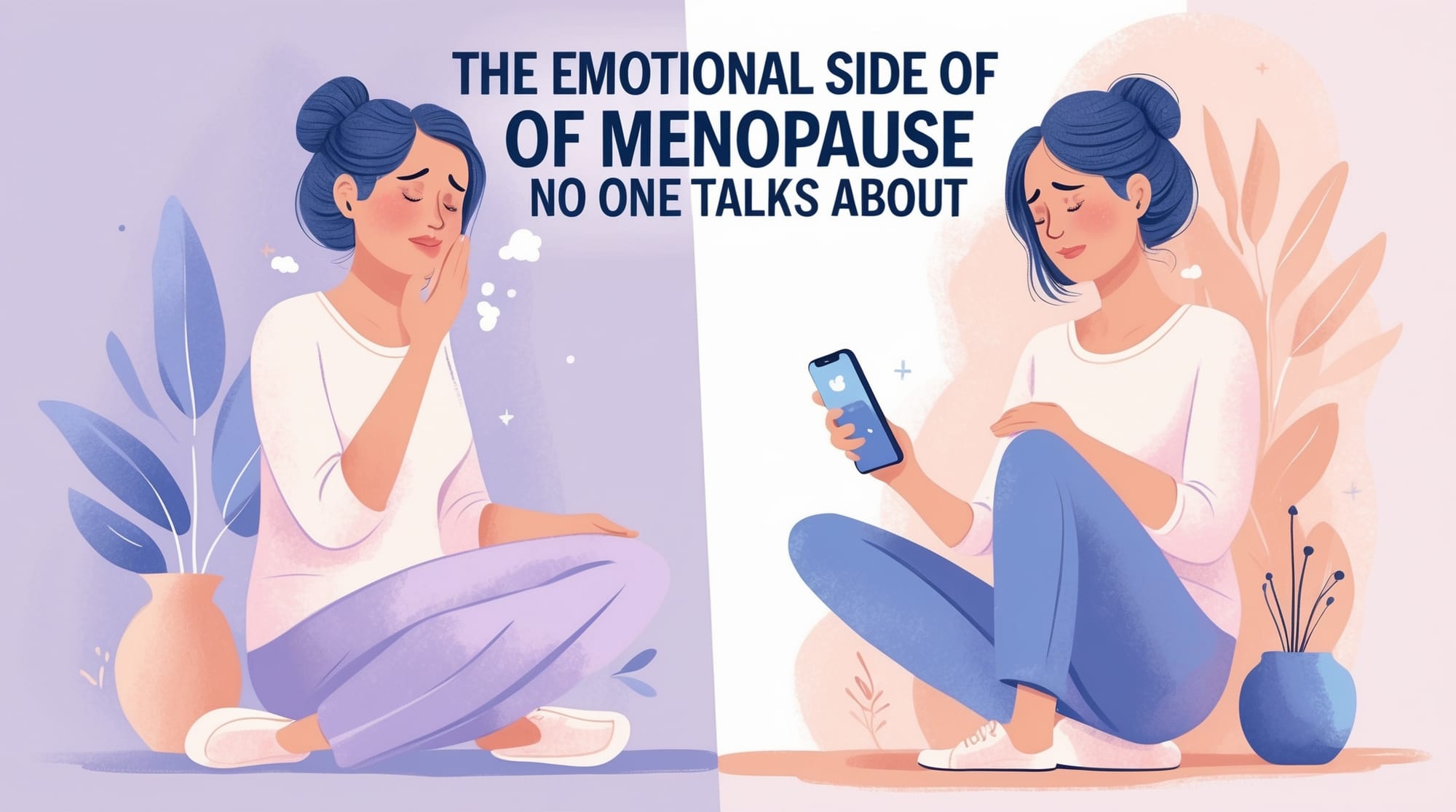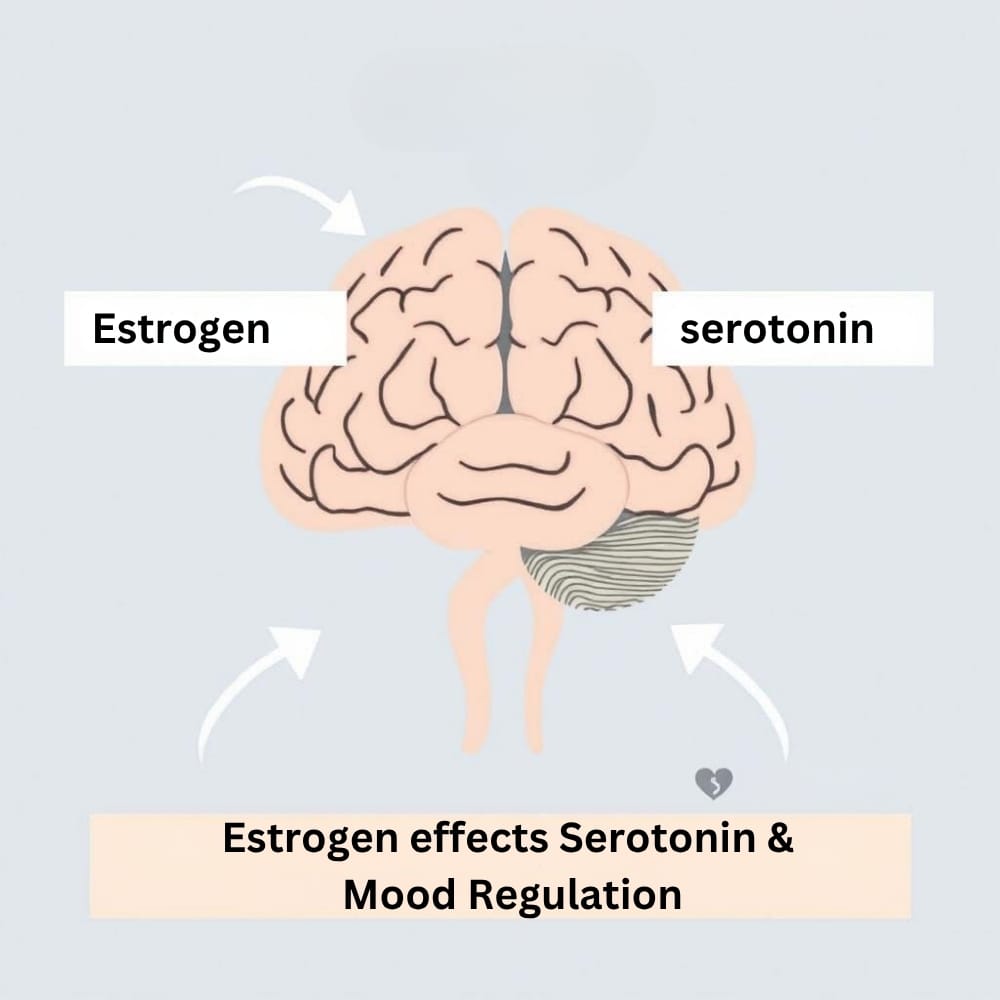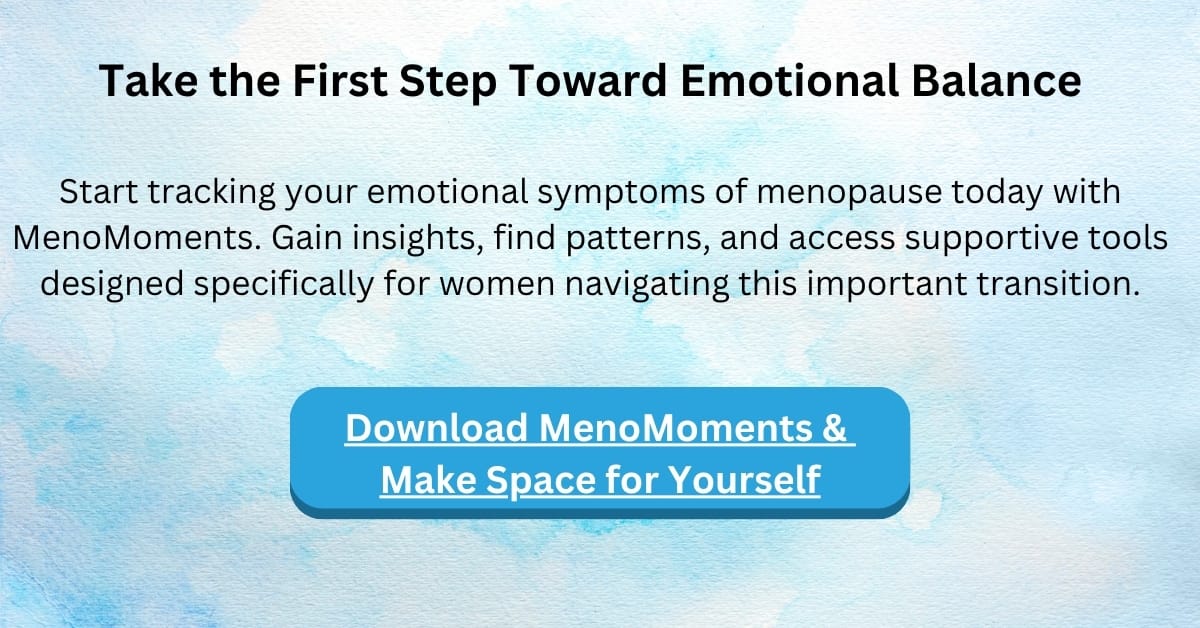The Emotional Side of Menopause No One Talks About
Menopause brings more than hot flashes—emotional symptoms like mood swings, anxiety, and brain fog are just as real. Learn why they happen and how the MenoMoments app can help you track patterns, gain insights, and support your emotional wellbeing.

Hot flashes and night sweats often dominate menopause conversations, but what about the emotional rollercoaster that many women silently endure? The emotional symptoms of menopause can be just as disruptive as the physical ones—yet they're frequently dismissed or misunderstood. If you've found yourself inexplicably tearful one moment and irritable the next, you're not alone, and you're certainly not "just being dramatic."
While physical symptoms get medical attention, the psychological impact of changing hormones often leaves women feeling isolated and confused. This guide explores the emotional landscape of menopause, explains why these feelings happen, and offers practical ways to navigate this challenging transition with greater awareness and support.

The Hormone-Emotion Connection: Why Your Feelings Fluctuate
The emotional symptoms of menopause aren't just in your head—they're in your biochemistry. Estrogen doesn't just regulate your reproductive system; it plays a crucial role in mood regulation and cognitive function. As levels decline during perimenopause and menopause, these changes can trigger significant emotional shifts.
Estrogen helps regulate serotonin and other neurotransmitters that affect mood. When estrogen fluctuates, these mood-regulating chemicals can become unbalanced, leading to emotional symptoms.
This hormonal fluctuation affects three key areas that influence your emotional well-being:
Mood Regulation
Estrogen helps maintain adequate levels of serotonin, often called the "happiness hormone." When estrogen drops, serotonin can decrease too, potentially leading to mood swings, irritability, and feelings of sadness.

Stress Response
Estrogen helps moderate your body's stress response. With declining levels, your body may produce more cortisol (the stress hormone), making you more reactive to stressors that you previously handled with ease.

Understanding this biological basis is crucial—your emotional symptoms aren't a character flaw or weakness. They're a natural response to significant hormonal changes happening in your body. Recognizing this connection is the first step toward managing these symptoms effectively.
Common Emotional Symptoms You Might Be Experiencing
The emotional symptoms of menopause can manifest in various ways. You might experience some or all of these feelings, and they may come and go unpredictably. Recognizing these patterns can help you develop strategies to manage them.
Mood Swings

Rapid shifts between feeling fine one moment and upset the next, often without an obvious trigger. These fluctuations can feel unpredictable and overwhelming.
Irritability & Anger

Finding yourself snapping at loved ones over minor issues or feeling a shorter fuse than usual. Small annoyances may trigger disproportionate reactions.
Anxiety

New or increased feelings of worry, racing thoughts, or a sense of impending doom. You might experience physical symptoms like heart palpitations or shortness of breath.
Sadness & Low Mood

Periods of feeling down or tearful without clear reason. This isn't necessarily clinical depression but can still impact your quality of life significantly.
Brain Fog

Difficulty concentrating, forgetfulness, or trouble finding the right words. These cognitive changes can affect your confidence and sense of competence.
Emotional Disconnection

Feeling detached from people and activities you usually enjoy. This can manifest as apathy or a sense of going through the motions without emotional engagement.
"I could handle the hot flashes, but the mood swings caught me completely off guard. One minute I'd be fine, the next I'd be crying over a commercial. Understanding that it was my hormones—not me losing my mind—was such a relief."
— Maria, 52
Sound familiar? These emotional symptoms can be particularly challenging because they're less visible than physical symptoms, making them easier for others (and sometimes ourselves) to dismiss. But acknowledging these feelings is crucial for your emotional wellbeing during this transition.
Why Awareness Is Your First Step Toward Emotional Balance
When it comes to managing the emotional symptoms of menopause, awareness is truly powerful. Simply recognizing that your feelings are connected to hormonal changes—and not a personal failing—can provide immense relief. This awareness creates space between you and your emotions, allowing you to respond rather than react.

Recognizing Patterns
When you track your emotional symptoms, patterns often emerge. You might notice that irritability peaks after poor sleep, or anxiety increases with caffeine consumption. These insights empower you to make targeted lifestyle adjustments.
Reducing Shame
Many women silently blame themselves for emotional reactions during menopause. Awareness helps normalize these experiences and reduces the additional burden of self-criticism that often accompanies them.
Try this: For one week, take a moment each evening to note your emotional state throughout the day. Include any triggers you noticed and how you responded. This simple practice can reveal valuable patterns and increase your emotional awareness.
The challenge is that our emotional states can be difficult to track objectively, especially when we're in the midst of experiencing them. This is where digital tools can provide valuable support and objectivity.
How Digital Tools Can Support Your Emotional Wellbeing
In today's digital age, technology offers new ways to manage the emotional symptoms of menopause. Apps designed specifically for menopause can provide structure for tracking, insights for understanding patterns, and tools for immediate relief during challenging moments.
Benefits of Digital Tracking
- Objective record of emotional patterns over time
- Identification of triggers you might not notice otherwise
- Validation through data visualization of your experience
- Convenient daily reminders to check in with yourself
- Privacy to explore feelings you might not share publicly
Features That Help Most
- Mood tracking with customizable options
- Guided breathing exercises for immediate relief
- Sleep quality monitoring to connect with emotional symptoms
- Pattern recognition through data analysis
- Educational content about menopause and emotions

The right digital tool can serve as both a daily companion and an objective observer, helping you navigate emotional changes with greater awareness and fewer surprises. When emotional symptoms feel overwhelming, having immediate access to calming techniques can make a significant difference in your day-to-day experience.
Introducing MenoMoments: Your Companion Through Emotional Changes
MenoMoments is an AI-powered app specifically designed to help women track, understand, and manage the emotional symptoms of menopause. Unlike general wellness apps, MenoMoments focuses on the unique emotional challenges of this life transition.

Personalized Tracking
Record your daily emotional states with customizable options that go beyond basic "good" or "bad" to capture the nuanced emotional experience of menopause.
Pattern Recognition
The app's AI analyzes your entries to identify patterns and potential triggers, providing insights like "Your irritability tends to increase after poor sleep" or "Anxiety often follows caffeine consumption."
In-the-Moment Support
Access guided breathing exercises, calming visualizations, and quick mindfulness practices when emotional symptoms feel overwhelming.
"Before using MenoMoments, I felt completely at the mercy of my changing emotions. Now I can see patterns emerging and take steps before my mood spirals. The breathing exercises have been especially helpful during stressful work meetings."
— Jennifer, 49
MenoMoments isn't a medical treatment—it's a supportive tool that empowers you with awareness and practical strategies. By tracking your emotional symptoms of menopause consistently, you gain valuable insights that can help you communicate more effectively with healthcare providers and make informed lifestyle adjustments.
Reclaiming Your Emotional Wellbeing During Menopause
The emotional symptoms of menopause may be challenging, but they don't have to define your experience of this significant life transition. With awareness, support, and the right tools, you can navigate these changes with greater ease and even discover new strengths along the way.
Remember that acknowledging your emotional symptoms isn't self-indulgent—it's an essential part of caring for your overall health during menopause. By tracking your emotions, identifying patterns, and implementing targeted strategies, you're taking an active role in your wellbeing rather than passively enduring symptoms.

Whether you're just beginning to experience perimenopausal changes or well into your menopause journey, it's never too late to prioritize your emotional health. The insights you gain now can serve you not just through menopause, but for years to come.

